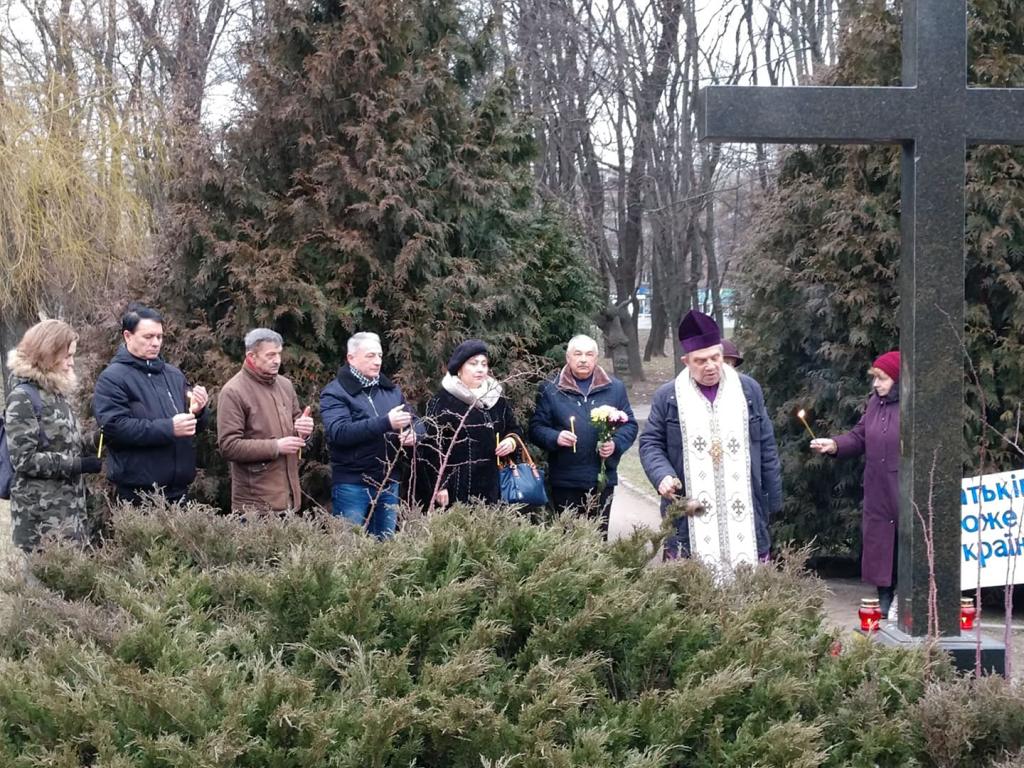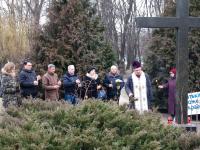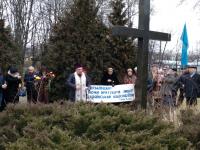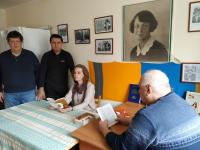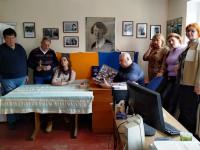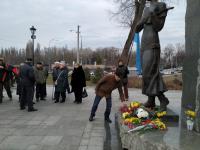On February 21, 2020, in the administrative building of the National Historical and Memorial Reserve "Babyn Yar" (48-B Melnikova Street) opened a photo-documentary exhibition "The greatness and sacrifice of Elena Teliga", a reciting of poetic and journalistic works by Olena Teliga.
At 16.00 on the territory of NIMZ "Babyn Yar" "near the cross in memory of those shot in Babyn Yar Ukrainian poetess Olena Teliga and members of the OUN, it was held a prayer for the repose of the soul of Teliga and heroes who gave their lives for the independence and unity of Ukraine. After the commemoration, an impromptu rally took place. The name of a prominent figure of the Ukrainian national liberation movement, a brilliant poet, a passionate publicist, for whom the words "life" and "struggle" were synonymous, and martyrdom - proof of the inseparability of the Word and Act, has been returned to the public consciousness.
On the morning of February 9, 1942, Olena Teliga went to the Union of Ukrainian Writers, where there was already a Gestapo ambush. The poet and other nationalists were shot dead in the last decade of February in Babyn Yar.
It is said that in the cell where O. Teliga was before the shooting, an inscription made by her hand was found: "Olena Teliga had been here and set off to be shot from there. A nationalistic Trident stylized as a sword was carved above it. It is said that after the death of O. Teliga, one of the executioners said that he had not seen a man die so heroically as this beautiful woman.
Olena Teliga's work belongs to the so-called "Prague School" of Ukrainian poets, or more precisely to the magazine "Literary-Scientific Bulletin" (1922-1931), "Bulletin" (1931-1939) edited by Dmytro Dontsov, which was published in Lviv and had a colossal influence on the formation of the literary process of that time. Poems "Flaming Day", "Turn", "To Convicted" can be one of the small cycles, where there is a pronounced civic attitude.
The first, though marked by a stamp of tragedy, is still optimistic. Manifesting her restless and tumultuous nature: "I want to live until life breaks, To rush into the mountain, or fly into the abyss", O. Teliga raises the ideal of Ukraine to the height of self-sacrifice:
Although there are so many people around,
But none of them will stop the step
If thrown into a moving crowd
The sharpest word is Ukraine
Olena was born in Ilyinsky near Moscow in an intelligent, semi-Belarusian, semi-Ukrainian family: mother - the daughter of an Orthodox priest; father Ivan Opanasovych Shovgeniv - a well-known specialist, hydraulic technician-practitioner. When the girl was five years old, the Shovgenovs moved to St. Petersburg.
From 1918 the family lived in Kyiv. In Kyiv, Olena studies at the Duchynska's Women's Gymnasium; studies Ukrainian along with Russian, German, French. She also studies such disciplines as the Law of God, Russian grammar, history, arithmetic, geography, calligraphy, drawing and sketching; however, based on the found estimates of young Olena in those years, we can say that she studied mediocrely. When private education was cancelled and all children should have been studied in the only regular labour schools, Olena joined one of them.
The father, a UPR government official, and his eldest son emigrated to Czechoslovakia in 1920. In the spring of 1922, Olena with her mother and brother Serhiy managed to escape from Soviet Ukraine, first to Poland, and in July 1922 to Podebrady in Czechoslovakia, where her father was the rector of the Ukrainian Academy of Economics at the time. It was in the Czech Republic that Olena first got a "matura" and then graduated from the historical and philological department of the Ukrainian Pedagogical Institute in Prague. Here she met her faithful friend Mykhailo Teliga, married him, and later went to be shot. It was in the Czech Republic that she became a poet, publicist and literary critic.
When World War II outbroke, Olena Teliga was staying in Poland - she had lived here since 1929 when her mother died in Warsaw. At that time her life became harder and poorer: sometimes she had to do musical performances in night cabaret - and even to work as a model, but then she managed to get a job as a primary school teacher.
In December 1939, in Krakow, Olena Teliga met Oleh Olzhych (Kandyba): at the same time she joined the Organization of Ukrainian Nationalists (OUN), there she worked together with him in the cultural and educational department.
However, the attraction to Kyiv lived in her soul constantly: "tragic" Kyiv was waiting for her - and she, not believing that she was in danger, left for the city of her youth with Ulas Samchuk and a few friends
. Without sparing time and health, O. Teliga and hundreds of her other colleagues set about organizing political, social and cultural life in Kyiv. O. Teliga was elected chairman of the Ukrainian Writers' Union, she participated in the founding of the literary and artistic Almanac "Lytavry" (timpani), the newspaper "Ukrainian Word".
The ascetic activity of the nationalists provides results. For the first time in the long years of Bolshevik enslavement, Kyiv began to speak openly about statehood, national symbols appeared, and the Church began to hold services in Ukrainian.
The newspaper "Ukrainian Word" mentioned various issues and was an anti-imperial one. The differences between Ukrainian and Russian culture and spirituality were constantly emphasized. There were cases when articles in which the authors praised the Führer, his "new order", were brought to the "Ukrainian Word" or the "Lytavry". Teliga refused to publish such posts, although this very often became an occasion for denunciations to the Gestapo.
Political life was active in Kyiv. In particular, on the initiative of the de facto head of the OUN in Ukraine O. Olzhych, the Ukrainian National Council was established, a representative body headed by the rector of Kyiv Polytechnic, Professor Mykola Velychkovsky. OUN Rada established contacts with all regions of Ukraine, with its assistance the Ukrainian Academy of Sciences, Kyiv University, Kyiv Polytechnic Institute - were resumed, a network of primary and secondary schools, the cooperative movement were established and regular delivery of food and firewood to the capital was organized.
Of course, the activity of the OUN in Kyiv could not be out of the attention of the German authorities for a long time. The capital lived in constant anticipation of arrests. The first wave of repression swept the city in December 1941. A number of underground nationalists were arrested. Among them were Ivan Rohach, Yaroslav Orshan-Chemyrynsky, Mykola Oliynyk, and other employees of "Ukrainian Word". The newspaper stopped publishing. The "Lytavry" was r closed a bit later.
Olena Teliga was also in mortal danger. She knew about it, but flatly refused to leave the city, and concentrated all her efforts on the work of the Writers' Union.
According to historians, on February 22, 1942, a Ukrainian patriotic writer was shot dead in Babyn Yar together with her husband and colleagues.
On February 21, 1992, on the 50th anniversary of the execution of Olena Teliga and her associates, a wooden cross was erected in Babyn Yar in memory of the executed OUN members.
On February 25, 2017, a monument to O. Teliza and her associates was unveiled on the corner of Ilyenko and Teliga streets.
